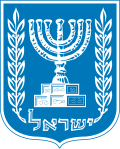| Part of a series on the |
 |
|---|
The September 2019 Israeli legislative election was held using closed list proportional representation. Each party presented a list of candidates to the Central Elections Committee prior to the election.
| Part of a series on the |
 |
|---|
The September 2019 Israeli legislative election was held using closed list proportional representation. Each party presented a list of candidates to the Central Elections Committee prior to the election.
The Blue and White list is headed by Benny Gantz and Yair Lapid; the list (up to the 30th slot) remains the same as in the April election. [1] [2]
The Democratic Union list is headed by Nitzan Horowitz. [3]
The Joint List is headed by Ayman Odeh. [4]
The Labor-Gesher list is headed by Amir Peretz. [5] [6]
The Likud list is headed by Prime Minister Benjamin Netanyahu. [7]
The Otzma Yehudit list is headed by Itamar Ben-Gvir. [8] [9] Baruch Marzel and Ben-Zion Gopstein were barred from running on 25 August 2019 by the Supreme Court of Israel. [10]
The Shas list is headed by Minister of the Interior Aryeh Deri. [12]
The United Torah Judaism list represents the Agudat Yisrael and Degel HaTorah parties, which have run jointly since 1992. The list is headed by Yaakov Litzman, and is identical to the April 2019 list.
The Yamina list is headed by Ayelet Shaked. [13] It is an alliance of the New Right and the Union of the Right-Wing Parties (URWP).
The Yisrael Beitenu list is headed by Avigdor Lieberman. [14]
The Zehut list was headed by Moshe Feiglin, [15] though Feiglin announced on 29 August that it would pull out of the race in return for a ministerial position and a push for the legalization of medical cannabis, pending a ratification of the agreement by Zehut members, [16] which was approved on 1 September. [17] On 3 September, the entire Zehut list withdrew from the elections, effectively eliminating the party's candidacy.
Minor parties in the order in which they registered with the Central Elections Committee. [1]